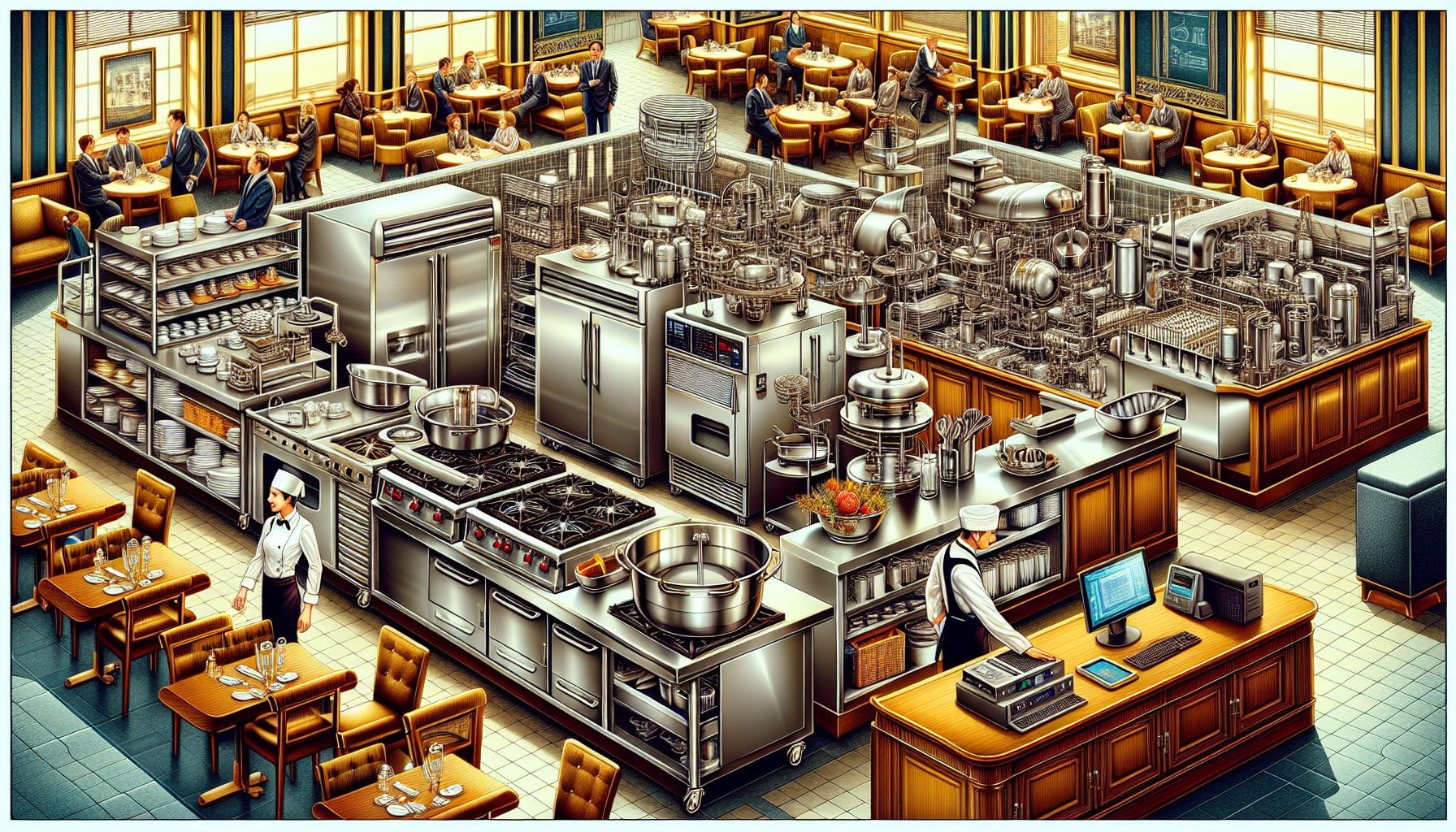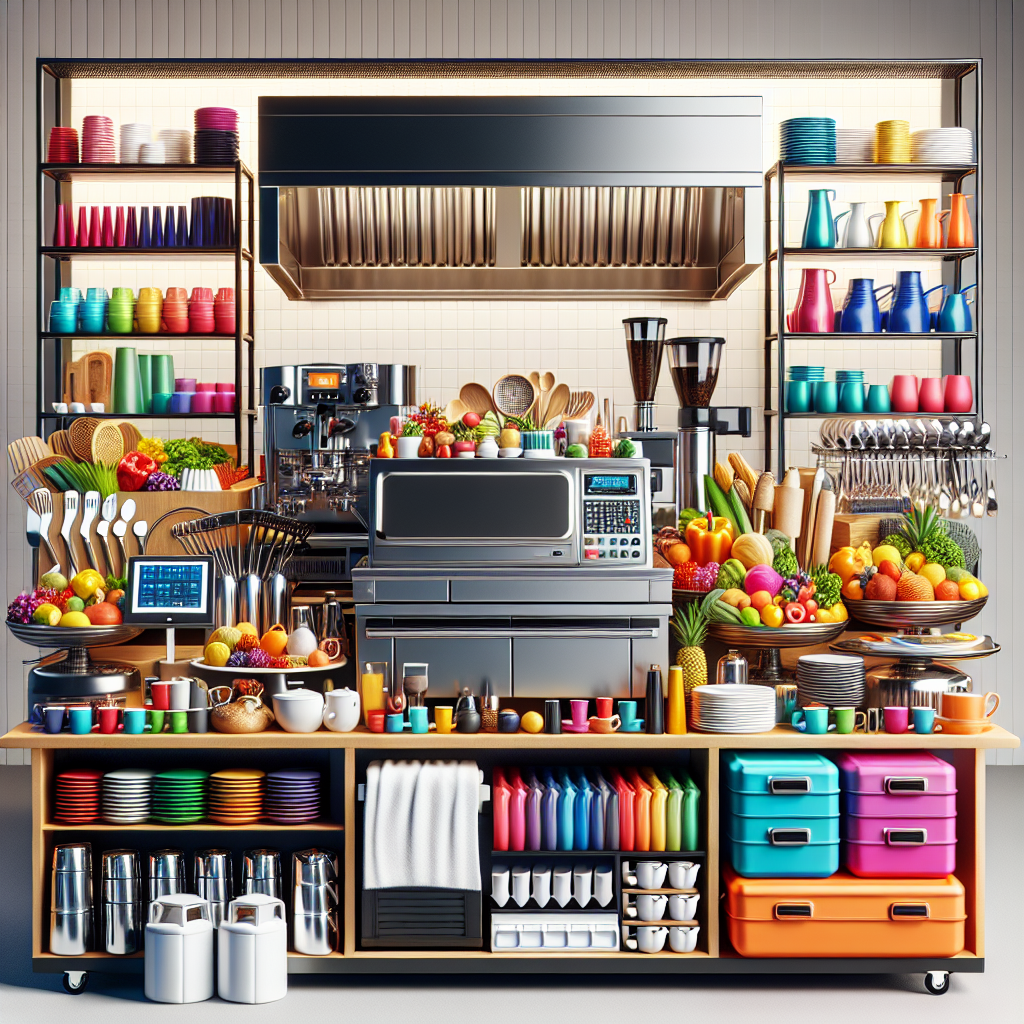Table of Contents
The hospitality industry is a vast and dynamic sector that encompasses lodging, food and beverage services, travel, tourism, and event management. Whether it’s a luxury hotel, a casual restaurant, a bustling café, or a sprawling resort, one common denominator is the essential role played by equipment. From the front office to the kitchen, from housekeeping to banquet halls, equipment forms the backbone of operations, ensuring efficiency, safety, and customer satisfaction.
This article explores the various types of equipment used in the hospitality industry, their significance, and best practices for managing them effectively.
1. Classification of Equipment in Hospitality
Hospitality equipment can be broadly classified into the following categories:
A. Front-of-House Equipment
This includes equipment used in areas that guests directly interact with, such as lobbies, reception, restaurants, and lounges.
- Reception Desks & Check-In Systems: Modern front desks are equipped with computers, reservation systems (Property Management Systems or PMS), key card encoders, and digital displays to streamline guest check-in/check-out processes.
- POS Systems (Point of Sale): Restaurants, bars, and cafés rely heavily on POS systems to record sales, process payments, and manage orders.
- Furniture & Fixtures: Sofas, chairs, tables, decorative lighting, and signage all contribute to the guest’s first impression and comfort.
B. Back-of-House Equipment
These are tools and machines used behind the scenes, typically in kitchens, laundry rooms, and administrative offices.
- Kitchen Equipment: This includes ovens, grills, refrigerators, freezers, blenders, slicers, mixers, and dishwashers. These tools are essential for food preparation and storage.
- Laundry Equipment: Hotels require heavy-duty washers, dryers, ironing machines, and folding tables to manage large volumes of linen.
- Office Equipment: Computers, printers, phones, fax machines, and filing systems are part of the administrative setup.
C. Housekeeping Equipment
Housekeeping plays a vital role in ensuring hygiene and cleanliness.
- Manual Equipment: Brooms, dustpans, mops, buckets, and vacuum cleaners.
- Mechanical Equipment: Scrubbing machines, polishing machines, and carpet cleaners.
- Linen and Cart Systems: Linen trolleys, maid’s carts, and waste bins are essential for organizing and transporting materials efficiently.
D. Banqueting & Events Equipment
Hotels and resorts often host conferences, weddings, and events, necessitating specialized tools.
- Audio-Visual Equipment: Microphones, speakers, projectors, and LED screens.
- Staging Equipment: Portable stages, podiums, lighting rigs, and decorations.
- Dining Equipment: Chafing dishes, banquet tables, serving trays, glassware, cutlery, and crockery.
E. Safety and Security Equipment
Ensuring guest and employee safety is paramount.
- Fire Safety: Smoke detectors, fire extinguishers, sprinkler systems, and emergency exit signs.
- Security Systems: CCTV cameras, biometric access control, alarm systems, and safes.
- First Aid Kits: Readily accessible in various locations to handle emergencies.
2. Importance of Equipment in Hospitality
Hospitality equipment is not merely a set of tools; it underpins every service delivered to the guest. Its importance is multifold:
- Efficiency: Equipment enhances speed and reduces manual labor, helping staff deliver consistent service.
- Quality: Kitchen appliances, for instance, ensure food is prepared uniformly and hygienically.
- Guest Satisfaction: Comfortable beds, clean rooms, and efficient service translate directly into positive guest experiences.
- Brand Image: Modern, well-maintained equipment reflects professionalism and care, influencing how guests perceive the brand.
- Health and Safety Compliance: Certain equipment is mandated by regulations to ensure the safety of guests and employees.
3. Factors to Consider When Selecting Equipment

When procuring equipment, hospitality businesses must consider the following factors:
A. Functionality
Equipment should fulfill the specific needs of the operation. For example, a buffet restaurant may require high-capacity food warmers and dispensers.
B. Durability and Quality
Hospitality equipment undergoes frequent and intensive use. Choosing durable and high-quality brands reduces long-term maintenance costs and downtime.
C. Energy Efficiency
With rising awareness about sustainability, many establishments opt for energy-efficient appliances that lower operational costs and reduce environmental impact.
D. Space Optimization
Space is often at a premium, especially in urban locations. Compact, multi-functional equipment helps in optimizing layout and workflows.
E. Compliance with Standards
All equipment must meet local health, safety, and environmental standards to avoid legal issues.
4. Maintenance and Management
Investing in equipment is only the first step; maintaining it ensures longevity and uninterrupted service.
A. Preventive Maintenance
Regular inspections and servicing prevent equipment failures. For instance, cleaning air filters or calibrating ovens improves performance.
B. Staff Training
Employees should be trained to use equipment properly. Incorrect use can lead to damage or safety hazards.
C. Inventory Management
Using digital systems to track equipment inventory helps with timely reordering, repairs, and depreciation management.
D. Vendor Support and Warranty
Choosing suppliers who offer after-sales support and extended warranties can reduce long-term risk and expense.
5. Trends and Innovations in Hospitality Equipment
With technology transforming every aspect of hospitality, equipment has also evolved.
- Smart Equipment: IoT-enabled devices in kitchens and guest rooms can be monitored and controlled remotely, improving efficiency.
- Touchless Systems: Post-pandemic, many hotels have adopted touchless check-ins, sensor-based taps, and voice-controlled room features.
- Sustainable Materials: There’s a shift toward biodegradable and recyclable materials, especially in food service equipment.
- Automated Housekeeping: Robotic vacuum cleaners and AI-powered cleaning systems are being introduced in luxury properties.
6. Equipment Impact on Hospitality
A. Hotel Kitchen Automation
A five-star hotel chain in Singapore reported a 30% increase in kitchen productivity after installing combi-ovens and automated frying systems, reducing prep time and human error.
B. POS Integration in Restaurants
An American bistro streamlined its order-taking process with a cloud-based POS system that integrated kitchen displays and mobile billing, significantly improving table turnover and customer satisfaction.
C. Eco-Friendly Laundry
A boutique hotel in Europe reduced water usage by 40% by installing energy-efficient laundry machines and implementing a towel reuse policy for guests.
Equipment in the hospitality industry is more than just tools and machines—it’s the infrastructure that supports the service, experience, and satisfaction guests receive. With the right equipment, managed well, hospitality businesses can operate smoothly, adapt to changing trends, and stand out in a competitive market. As the industry continues to innovate and grow, investing in modern, efficient, and sustainable equipment will be a key factor in delivering excellence and building lasting guest relationships.
HOTEL MAVERICKS say’s: Opening a hotel can be a lucrative business venture, but it’s important to understand the equipment, tools, and supplies you’ll need to get started.

Leave a Reply